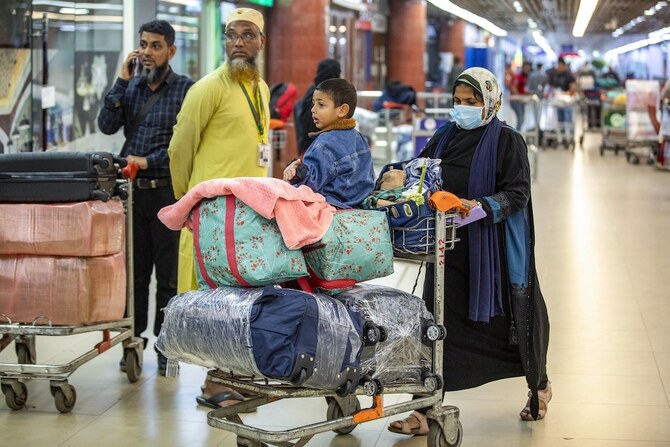DHAKA: As she fled Israeli airstrikes on Lebanon, Morium Begum was not sure she would ever see her family again.
The Bangladeshi mother of two was working as a housekeeper in the southern city of Nabatieh, which came under Israeli fire in late September.
“There were huge explosions everywhere and continuous bombing around me,” Begum told Arab News. “The situation had become so bad that it was no longer possible to stay there.”
She joined a group of other Bangladeshis heading to Saida, 30km away, where the Bangladeshi embassy and local NGOs are providing shelter to around 300 Bangladeshi migrant workers, according to Begum.
Begum was one of around 120 Bangladeshi nationals to have been evacuated from Lebanon in the past few days. After working abroad for 14 years, she has returned home with nothing.
“The situation was very, very dangerous. I didn’t even get the chance to bring any clothes with me,” she said. “I’m not sure if the house I lived in is still standing ... I left all my belongings in that house. I am returning home empty-handed. Still, I am grateful to Allah for being able to return.”
The death toll from Israel’s attacks on Lebanon since the beginning of October stands at more than 2,600, the Lebanese Health Ministry said on Friday. More than 12,200 people have been injured in air and ground raids, many of which have targeted civilian and medical infrastructure.
Shila Khatun, who worked as a domestic helper in the same area as Begum and also sought shelter in Saida, said the house she worked in has now been destroyed. “I would have been dead if I stayed there for two or three days more,” she added.
But staying at the shelter in Saida was no guarantee of safety. On the day she arrived, Khatun said, a bomb fell just 100 meters away.
“It was like hell on earth,” she said. “For a few minutes I couldn’t see or hear anything. Words can’t describe the horror. At one point, I lost all hope.”
There are between 70,000 and 100,000 Bangladeshi nationals living in Lebanon, many unofficially. The Ministry of Foreign Affairs says the process of their repatriation has been complicated not only by airport closures but also by lack of proper documentation.
Mohammad Uzzal, who was working at a restaurant in Nabatieh, was fortunate that his employer found him after he and the rest of the staff — along with many local residents — decided to leave and seek shelter in Saida.
“Many of us — Bangladeshi, Lebanese, and other nationals — rushed to a safer location,” Uzzal said. “I couldn’t bring any money with me. My passport was with my employer. Later on, when I reached the shelter, my employer brought my passport, and he also gave me some money. Fortunately, all of my wages got cleared by the employer. I feel lucky.”
Like Begum and Khatun, Uzzal was also evacuated last week.
“I have two small children. Every moment, I prayed to Allah to grant me a few days more on this earth to look after my children,” he said. “To me, this is like a second life.”
























